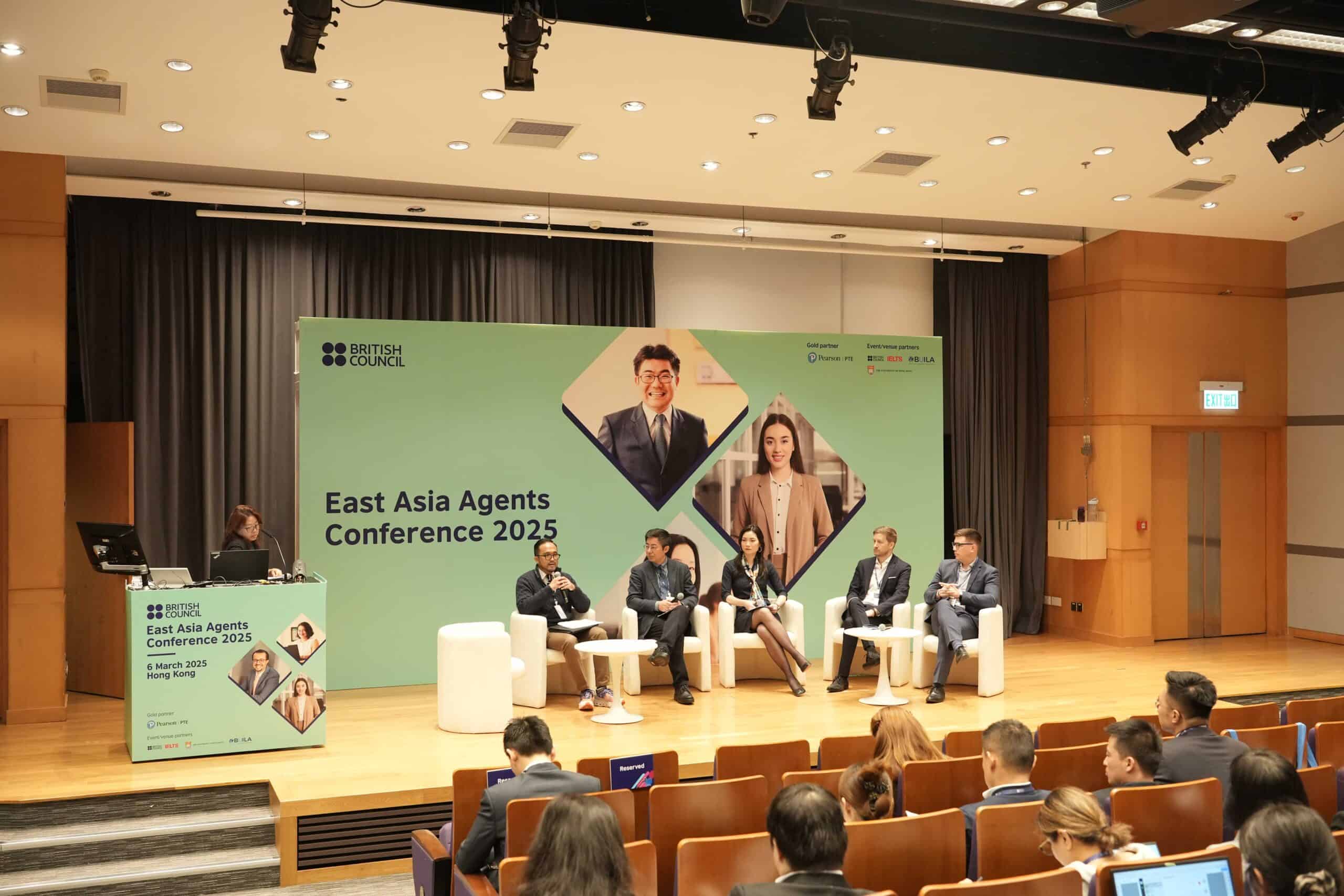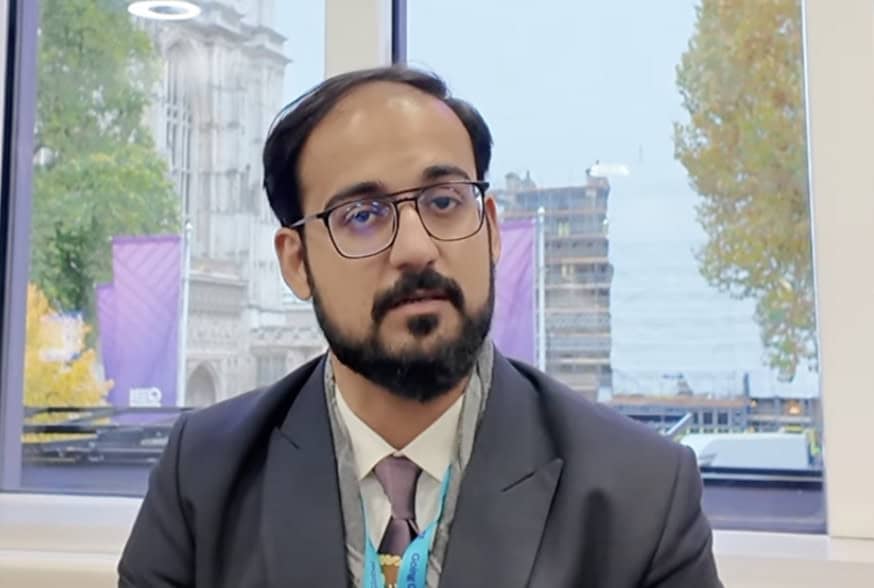The post Studying in Scotland as a Pakistani student appeared first on The PIE News.
Category: British Council
-

British Council undeterred after Russian strike “practically obliterated” Kyiv HQ
Speaking on August 29, two days after an attack on the Ukrainian capital in which at least 16 people were killed, the British Council’s director for the country, Colm McGivern, laid bare the impact on the organisation’s offices in Kyiv.
Standing outside the ravaged offices, which were severely damaged after Russian forces fired two missiles at it, McGivern said that the building had been “absolutely devastated – it’s been practically obliterated”.
While extending condolences to the families of those who died during the “horrific attack”, McGivern was firm in his resolve that the British Council’s work in Ukraine would continue even as the war with Russia wages on.
“I’d like to tell everyone that the British Council’s resolve is still there,” he said. “We will be here in Ukraine, we’ve been here 30 years. We’ll continue our work.”
He pointed out that the organisation did not stop its work in Ukraine following Russia’s invasion in 2022, and that this will not change. “To the contrary, we’re more determined than ever to make sure that cultural and educational links between the UK and Ukraine can thrive, not just survive,” he said.
He pledged that an upcoming British Council event in Lviv, located in the west of Ukraine, would take place this week as planned, as well as promising young Ukrainians that face-to-face learning would also resume in the coming days.”We will keep those promises. We will start those classes,” he stressed.
McGivern extended best wishes to a British Council colleague who had been injured on the evening of the attack, who he said was recovering in hospital. And he said his team had been overwhelmed by the support they had received from the international education community, as well as the Ukrainian first responders and emergency services who helped in the immediate aftermath of the attack.
There has been an outpouring of support for British Council colleagues in Ukraine by the international education community.
Our work will not stop now because of this horrific attack. To the contrary, we’re more determined than ever
Colm McGivern, British CouncilGwen van der Helden, a professor of education reconstruction during/post war, crisis and conflict at the University of Warwick and a visiting professor at V. N. Karazin Kharkiv National University, expressed her shock.
“The BC is hardly of military interest, not a danger to anyone, and the people working there do nothing than trying to contribute to the future of fellow citizens. It is utter codswallop to think that the BC is in any way a reasonable target. But then, so few of the targets that have been hit in this war have been,” she wrote on LinkedIn.
“Furious is how we should all feel at this point. Our colleagues in Kyiv (and yes I do think we should regard BC colleagues as exactly that), deserve better.
Sending courage, strength and a large portion of defiance to our British Council colleagues.”The British Council’s mission in Ukraine offers English language programs and other training or educational programs. In June, Russia made accusations that it was being used as a cover for British intelligence operations in Kyiv.
After the attack, British Council chief executive Scott McDonald confirmed that bombing in the city had damaged its offices.
“Our guard was injured and is shaken but stable. At the insistence of my amazing colleagues, we will continue operations in Ukraine today wherever possible,” he said.
Meanwhile, European leaders have condemned the strike, which saw 629 missiles and drones launched at the city.
President of the European Council, António Costa, confirmed that the British Council’s Ukrainian office “was damaged in this deliberate Russian strike”, while UK Prime Minister Keir Starmer hit out at Vladimir Putin – accusing him of “sabotaging peace”.
-

Agent Advisory Groups set to strengthen UK-East Asia recruitment links
Addressing the audience at the British Council’s East Asia Education Week 2025, held in Hong Kong, Xiang Weng, visa outreach officer for South China/ West China/ Hong Kong and Macau Visa, British Consulate – General Guangzhou, described a “new concept” which would see agent advisory groups set up to enhance collaboration.
“One of our colleagues from Vietnam set up what we call our Agent Advisory Groups and tested the concept there. Now, we plan to expand it across the rest of East Asia,” said Weng.
“By having these advisory groups, UKVI can build a much stronger connection with agents, gain valuable local intelligence, and share insights with our Home Office colleagues. This will help us introduce and improve our visa services across the region.”
Though UKVI didn’t confirm plans to introduce agent advisory groups in the broader East Asian region to The PIE News, it noted that it continually works with overseas stakeholders, including the British Council, to support prospective students by addressing their questions about the UK visa system.
Over the years, Vietnam has played a pioneering role in the UK’s efforts to increase transparency among agents in East Asia.
By having these advisory groups, the UKVI can build a much stronger connection with agents, gain valuable local intelligence, and share insights with our Home Office colleagues.
Xiang Weng, British Consulate-General Guangzhou
Just last year, over 130 education advisers in Vietnam earned the prestigious “I am a UK-certified counsellor” badge, as part of the Agent Quality Framework, showcasing their expertise and deep understanding of the UK as a study destination.
According to Weng, the concept’s success in Vietnam can be emulated in the broader East Asian region.
Though visa approval remains high in East Asia, students still fall victims to common mistakes, she explained.
“Some students forget to provide a TB (tuberculosis) certificate or evidence of finances which can impact their applications,” stated Weng.
“In countries like Japan, Korea, Malaysia, Singapore, China, and Hong Kong, when applying for a student visa, you only need to submit your passport and TB certificate. That’s it. You don’t even need to apply for IELTS or provide evidence of finances.”
Though visas challenges have not proved to be a major barrier for UK universities accessing the East Asian student market, intra-regional mobility and price concerns are leading to fluctuations in demand for UK education, as reported by The PIE News.
According to Daniel Zheng, managing director, HOPE International Education, safety concerns and career prospects have also become key factors influencing student choices in East Asia, particularly in China.
To tackle these challenges, UK universities are increasingly turning to in-house employability services and other affordability options for international students.
“In terms of affordability, many UK universities, including ours, have in-house employability service teams. Their role is to enhance students’ employability and expand their career opportunities after graduation,” stated Scarlett Peng-Zang, East Asia regional head, University of Nottingham.
“So I believe that there’s something everyone is working on regarding addressing the economic uncertainty. I found lots of UK universities offer alternative payment options to improve affordability. So is the same for Nottingham University.”
As rankings of East Asian universities rise and the countries set mammoth targets for international students, agencies are also looking inward for recruitment opportunities, expanding beyond the UK.
“In the past six months, my colleagues and I have traveled to Singapore and Malaysia three times, visiting UK university campuses like Southampton and Nottingham, as well as boarding schools like Epsom College,” stated Zheng.
“This indicates that there is significant interest – not just from us, but also from our partners and institutions – in the Malaysian market, particularly from China.”
These changing trends come at a time when UK institutions are under pressure to measure the return on investment of their agents, according to Fraser Deas, director, client success, Grok Global.
“We are noticing that UK institutions are under pressure to measure the ROI of their agents. How can we work with them, along with in-country staff, to ensure that agencies provide evidence that these partnerships are going well? There’s important work to be done in that sense,” stated Deas.
“I think there is a genuinely good understanding in the sector of the difference between in-country staff and agents. The role of a third party should be to facilitate that relationship without interfering, but it remains very important.”
Agents and universities having a direct relationship has also become important for UK-East Asia relations, with organisations like BUILA demonstrating how agents can be compliant with the UK National Code of Ethical Practice as the Agent Quality Framework comes in focus.
As per Dave Few, Associate Director, Jackstudy Abroad, while education agents are already performing well, there is a concern about maintaining quality as more agencies enter the market, particularly through aggregators.
“In my unbiased perspective, I think agents are already doing a fantastic job. The key factor is the quality of information – ensuring that as the barrier for entry for new agencies lowers through aggregators, the quality remains consistent,” stated Few.
“Whether that means requiring a year of training from the very beginning or another measure, the priority should always be keeping the student at the heart of the conversation, not revenue.”
-

UK-Egypt mission sparks new era of higher education partnerships
From 16-18 February 2025, a high-level delegation from the UK visited Egyptian universities: Ain Shams University, and European Universities in Egypt (EUE); with a planned visit to New Cairo Technological University, to explore possible collaborations between the two countries.
“Over the course of three enriching days, the education team in Egypt led a higher education mission that was launched in the New Administrative Capital, under the patronage of the Minister of Higher Education through the Supreme Council of Universities and the Egyptian Bureau for Cultural and Educational Affairs in London in collaboration with the British Council in Egypt, and the support of the British Embassy,” Heba ElZein, director of education at the British Council in Egypt told The PIE.
The delegation comprised representatives from prestigious UK universities, including Sheffield Hallam University, Loughborough University, the University of Essex, the University of East Anglia, the University of Exeter, and the University of Chester.
Universities UK International representatives were also in attendance, with Anouf El-Daher, policy officer for Africa and Middle East at UUKi, presenting at the British Embassy in Cairo and British Council Egypt, highlighting the value of international collaboration and the potential for long-term, mutually beneficial, EU-Egypt education relationships.
“Over three days, we visited higher education institutions across Egypt, gaining valuable insights into the local landscape and exploring opportunities for deeper collaboration. This mission allowed us to engage with key stakeholders, understand the evolving higher education landscape in Egypt, and witness the impact of UK-Egypt partnerships firsthand,” a LinkedIn post from UUKi read.
Over the course of three enriching days, the education team in Egypt led a higher education mission that was launched in the New Administrative Capital
Heba ElZein, British CouncilThe mission offered numerous networking opportunities, as well as joint meetings for Egyptian universities wishing to cooperate and discuss opportunities with their British counterparts.
The delegation’s primary focus was to foster academic exchange, establish international university branch campus opportunities, and strengthen research collaborations. One of the most significant outcomes of the visit was the signing of multiple Memorandums of Understanding (MoUs) between UK and Egyptian universities.
During that high-profile participation, three MoUs were signed between the University of Essex and Ain Shams University, the University of East Anglia and Ain Shams University, and the University of Sheffield Hallam and the British University in Egypt.
These agreements are expected to facilitate joint programs, faculty exchanges, and shared research initiatives in the coming years.
Students in Egypt show a strong interest in TNE as the UK-affiliated programs offer tuition fees from £800 to £13,500, depending on the partnership model. And due to economic and currency challenges, Egyptians are increasingly likely to opt to study in Egypt on a TNE model, as well as inbound students to the country, primarily from Malaysia, Indonesia, Thailand, Nigeria, and Iraq.
Thus, with a population of around 111 million, and a youthful median age of 24.3, Egypt leads the MENA region in TNE enrolments with 27,865 students in 2022-2023, making it the 5th largest UK TNE host country globally.
Egypt has emerged as a leading host of UK transnational education students in the MENA region, and the UK remains Egypt’s largest partner in higher education.
This delegation’s visit is part of a broader initiative to further deepen these ties and provide Egyptian students with greater access to high-quality British education.


